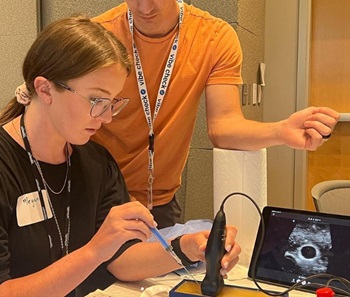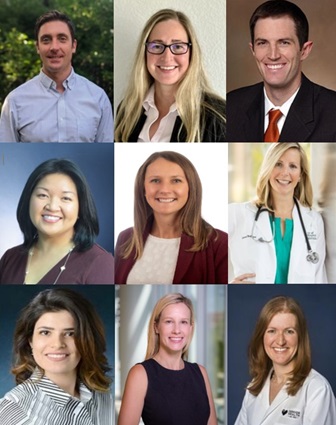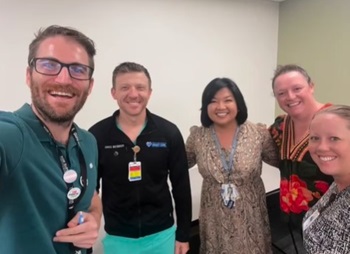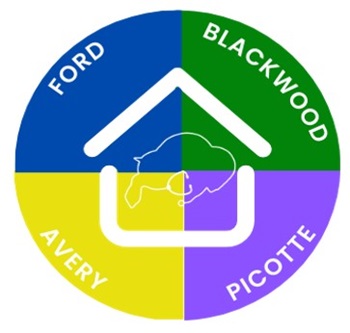 Mentorship
Mentorship
We are fortunate to have a large and diverse faculty, including MDs, DOs, and PhDs, who are invested and eager to mentor our residents. The breadth of the medical campus, including a School of Public Health and liaisons with National Jewish Medical Center and the Children's Hospital, opens wide doors for residents to pursue various career goals within their internal medicine training.
Clinical Coaching Program
 The Clinical Coaching Program pairs each incoming intern one-on-one with a faculty coach for the duration of their residency training. Pairings are made based on self-reported attributes and interests. Faculty coaches have received basic coach training and are provided with a graduated coaching curriculum for each year of residency. Residents are encouraged to meet with their coach 3-4 times per year to reflect on residency including the lessons that are being learned and the challenges being faced. This is typically off campus and at the discretion of the coach and resident, often over a meal, coffee, or outdoor activity. Coaching meetings are an opportunity for decompressing, celebrating successes, and thinking about the big picture.
The Clinical Coaching Program pairs each incoming intern one-on-one with a faculty coach for the duration of their residency training. Pairings are made based on self-reported attributes and interests. Faculty coaches have received basic coach training and are provided with a graduated coaching curriculum for each year of residency. Residents are encouraged to meet with their coach 3-4 times per year to reflect on residency including the lessons that are being learned and the challenges being faced. This is typically off campus and at the discretion of the coach and resident, often over a meal, coffee, or outdoor activity. Coaching meetings are an opportunity for decompressing, celebrating successes, and thinking about the big picture.
Coaches are available to their residents to support, encourage and facilitate individual success. In contrast to a mentor, coaches are trained to help their residents discover their goals and devise a plan to achieve them. Coaches are isolated from the formal residency structure in an effort to provide a confidential and safe space for any topic of discussion related to life or training. Many coaches and trainees forge career-long bonds. Critically, this relationship is at the discretion of the resident and is not mandatory.
Overall the Clinical Coaching Program provides an opportunity for residents to connect personally outside of the clinical setting with caring faculty role models dedicated to the goal of maximizing the potential of each resident.
Associate Program Director

In addition to your Program Director Dr. Connors, there are a number of senior educators looking out for your training as well as your wellbeing. We have a dedicated and longstanding group of Associate Program Directors (APDs) who are spread across our three sites. This group is committed to your education and growth.
Each intern is specifically assigned to one assistant program director in addition to their coach. This dedicated individual, with expertise in resident mentorship, develops a strong personal and professional connection with each intern. Constructive feedback and comprehensive evaluation is an essential element of personal and professional development. Each resident has semi-annual meetings with their assigned mentor to review evaluations and overall performance, as well as to plan for the future by addressing issues such as finding a research project, choosing electives, fellowship applications, and looking for a job. Beyond this formal mentor, each intern is paired up with a similarly minded faculty member who is their Clinical Coach. As such, each intern/resident has multiple layers of mentorship and coaching throughout their residency training including their intern team, APD mentor, and Clinical Coach.
Subspecialty Education Coordinators
 As residents are ready to define their career path towards a subspecialty, area of research, practice base, or further training platform, we actively assist them in finding their “second tier” of mentors – those in their area(s) of interest who can serve as direct role models. Subspecialty education coordinators (SECs) are subspecialist faculty appointed to act as educational leaders for that subspecialty in the residency program. They review elective learning goals and objectives, review and adjust the curriculum for that subspecialty, and connect with residents interested in that specialty. Subspecialty research coordinators (SRCs) are subspecialist faculty who act as liaisons for residents who are interested in that subspecialty to help connect them with research opportunities and mentors.
As residents are ready to define their career path towards a subspecialty, area of research, practice base, or further training platform, we actively assist them in finding their “second tier” of mentors – those in their area(s) of interest who can serve as direct role models. Subspecialty education coordinators (SECs) are subspecialist faculty appointed to act as educational leaders for that subspecialty in the residency program. They review elective learning goals and objectives, review and adjust the curriculum for that subspecialty, and connect with residents interested in that specialty. Subspecialty research coordinators (SRCs) are subspecialist faculty who act as liaisons for residents who are interested in that subspecialty to help connect them with research opportunities and mentors.
Categorical residents planning to pursue a subspecialty career are paired with a faculty member with similar research interests to encourage and facilitate a productive research path during residency. Similarly, residents pursuing a career in hospitalist medicine or primary care are assigned a mentor within their chosen field with similar career aspirations.
Confidential Advisors
As an added measure of support, a confidential mentor system is in place for our residents. These confidential advisors are General Internal Medicine faculty and are NOT directly involved with the residency training program. They are available for additional mentorship and guidance as well as a confidential support system to help with physical and mental health needs.
Residency Houses

Starting in 2022 we revamped our Social Cohorts into Resident Houses to enhance the resident connection. Once you join our program you become part of the CU family and one way we try to make our large program seem smaller is to sort you into a house. These houses were thoughtfully named after prominent minority pioneers who have represented and advocated for underrepresented groups in medicine and society:
- House Ford - Named after Dr. Justina Ford, the first Black female physician in Colorado.
- House Blackwood - Named after Dr. Charles Blackwood, the first Black doctor to graduate from CU.
- House Avery - Named after Dr. Alida Avery, the first female internist in Colorado.
- House Picotte - Named after Dr. Susan LaFlesche Picotte, the first Indigenous American (Omaha tribe) woman in the US to earn a medical degree.
Each house includes a set of Chief Residents, Associate Program Directors, and Core Faculty who have opted into this program because they love mentorship and being able to socialize with our residents.
Our goal is that your house will help you create connections, foster some healthy competition during residency (Yes YOU can earn house points!), and give you opportunities to network with mentors across our program. In addition, your house Chief Residents will put on special social events that are designed only for your house which are an added bonus to our residency-wide social events.
There are several ways a resident can earn points for their house. While the points system is comprehensive, some examples of ways points can be earned are:
- Attending noon conference;
- Submitting abstracts;
- Going to social events;
- *most importantly* Submitting kudos for co-residents
.tmb-image700.jpg?Culture=en&sfvrsn=be4f62bb_1)